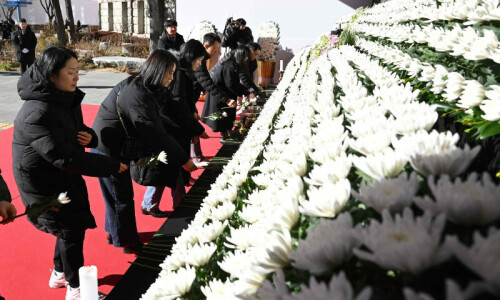MALLIKARJUN Kharge of humble Dalit origins defeated the polished Shashi Tharoor of the ‘Why-I-am-a-Hindu’ faux liberal club. Kharge is the popularly elected president of India’s oldest party, but neither he nor Tharoor jointly or individually can claim to have the political capital that the Gandhi family commands, individually and jointly. This could be the tragedy of the Congress for some.
It could be the USP for others. But it’s a good thing that Mr Kharge is president and not someone from the Gandhi family. This polite eviction of the Gandhis from the party leadership is what the corporate media and many public intellectuals wanted. Now they can relish the moment. Rahul Gandhi is also pleased. He responded to the change of guard with relief: “I will report to Khargeji.”
Rahul Gandhi’s five-month cross-country march aims to restore the health of his ailing party and also his even more troubled country. Walking through 12 states and covering 3,570 kilometres in 150 days is not a miraculous feat as such, but nor are Rahul’s capabilities with deep-sea diving that he can flaunt at will without the need for the cameras to showcase his amphibian lungs. But holding the hand of a hijab-clad schoolgirl in a beaming picture of both in the communally polarised Karnataka is what Nehruvian and Gandhian India was all about.
So let’s not interrupt the singularly good news from the march with due respect to Mr Kharge’s important elevation. He has a task cut out and he acknowledged it in his opening remarks as president. Defeating fascism is his primary objective. The quest is an urgent one but he has to desist from equating it with winning elections. Congress on its own cannot defeat Hindu fascism.
Kharge’s job would be to harness the energy from the march to stitch up a coalition with the only purpose of defeating fascism, nothing more and nothing less. Far too often the Congress has found itself dropping the catch. Its habit of pressing for seat-sharing has stymied the opposition. The need to weld the opposition into a formidable winning force is greater than the quest to have a Congress prime minister.
Another important lesson Rahul Gandhi would have learnt from his ‘Bharat jodo yatra’ (unite India march) is about the historic folly of his party’s strong-centre policy. It was this vision of a centrally ruled country that proved to be calamitous in 1947 after its leaders to the chagrin of Maulana Azad thumbed their noses at the Cabinet Mission Plan.
They opposed a free India as a federation of autonomous regions not very different from the democratic architecture flourishing in some very prosperous and powerful countries. The concentration of power at the centre in denial of a federal structure has neither worked for India nor for Pakistan. Rahul Gandhi’s rare insights gained from traversing and embracing 12 rather disparate regions should help him understand the essence and the need for a strongly federated India as opposed to the BJP’s belief in a Delhi-centric (or Nagpur-centric) nation state.
Congress on its own cannot defeat Hindu fascism.
As for Mr Kharge’s resolve to fight fascism, an object lesson of the Second World War was that the mission often requires awesome military might of powerful nations, capitalist and communist nations in lockstep, to overcome the challenge. Millions perished in gas chambers and many more millions died on battlefields before fascism could be tamed in Europe. The Congress party chief should be relieved that India does not quite yet face the challenge the Nazis posed in Europe, which really is a less acknowledged blessing albeit with a time limit.
Kharge was of course referring to the threat Indian democracy faces from Hindutva, a pernicious doctrine widely seen as borrowing features from the Nazi worldview and practices. The Indian clone may flaunt features of the Fuehrer, chiefly his diligently crafted cult status and an ability to sway the masses with half-truths. But he is not invincible in a genuine political fight yet. Nor was Hitler until March 23, 1933, when he passed an act to suspend democracy to acquire dictatorial powers. That’s not yet the case in India, but the clock is ticking.
Kharge may notice a contrariness about the prowess of right-wing rulers. The 1929-30 economic depression was oil in the fire for a troubled Germany. The shattered economy galvanised Hitler’s rise rather than the left. Mr Kharge would do well to desist from believing that the economic mess under the present government would inevitably make it unpopular, and lead to its defeat.
It has worked in just the opposite ways. Often, the more the government blunders the more it diverts its resources for cover-up by instilling hate, fear and divisiveness in people while a pliant media paints a rosy picture of the state of the nation. What could be more contrary than the fact that more women are voting Republican in next month’s mid-term polls, Republicans who favour the bar on their abortion rights, which President Biden is going hoarse opposing?
The only way for Mr Kharge, indeed for the opposition, is to tap into the groundswell of democratic energy generated by Rahul Gandhi’s march. The Congress wanted a second freedom movement. This could be the beginning of one albeit at portentous risk to Rahul’s life.
Kharge might want to rediscover the spirit of the Young Turks for the Congress that had become the emblem of the party’s youthful spirit, appealing to reason while shunning parochial pursuits. Despite the name, Young Turks included many Arabs, Albanians, Jews, and initially, Armenians and Greeks too. Former prime minister Chandrashekhar was celebrated as a leader of the Young Turks in Indira Gandhi’s Congress. They kept the party scrupulously to the left of the centre where India’s heart is.
The writer is Dawn’s correspondent in Delhi.
Published in Dawn, October 25th, 2022










































